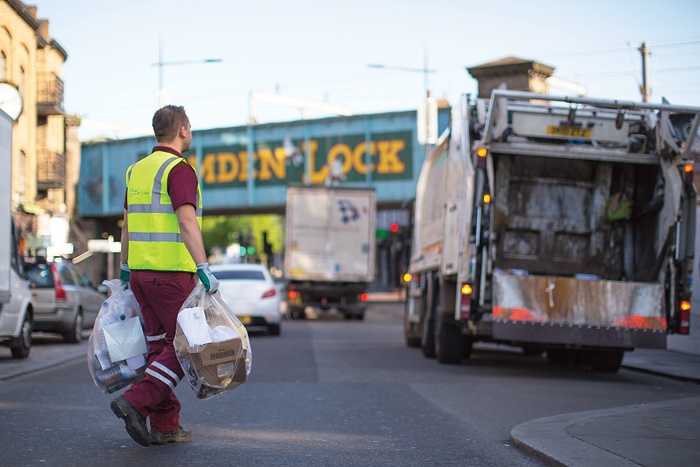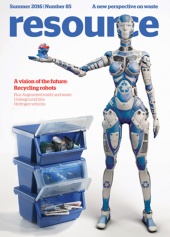Resource London: what's being done to make the capital gain ground on the recycling game?
In February 2015, a new partnership, Resource London, was launched to support London’s waste authorities in saving money and recycling more. Leonie Butler catches up with what’s been going on

Let’s face it: our nation’s capital, where more than a tenth of the UK’s population resides is not leading the way when it comes to recycling. In 2014/15 London’s household recycling rate fell by more than 0.8 percentage points to 33.1 per cent (a continuing trend from 2013/14, when it fell by 0.05 per cent to 34 per cent). This is well below England’s national average of 43.7 per cent, which itself has been criticised for falling so far behind the impressive 54.6 per cent recorded by Wales in 2014/15. Overall, recycling rates in the capital have stalled; householders are often confused about the ‘what and how’ of recycling; material quality needs to improve; and local services are under budgetary pressures.
In a bid to focus resources and efforts in a cost- efficient way Resource London was set up in 2015 as a jointly funded partnership between the London Waste and Recycling Board (LWARB) and the Waste & Resources Action Programme (WRAP) to create a one-agency approach for waste authorities and maximise the resources of both organisations for the benefit of London.
Resource London is not a waste partnership in the classic sense, as it doesn’t control any waste or deliver any frontline services. It exists purely to help London’s waste authorities achieve more consistent, harmonised and efficient waste and recycling services. The objective of the programme is that by 2020 London will be:
- recycling 50 per cent of local authority collected waste;
- making an effective contribution to the Mayor of London’s CO2 emissions performance standard; and
- making a significant contribution towards England achieving its 50 per cent household waste recycling target.
For 2016-17, Resource London has a programme budget of £2.2 million and LWARB and WRAP have stated an aspiration to be part of the five-year programme to 2020. In Resource London’s programme plan 2016-2017, Councillor Clyde Loakes, Chair of the Resource London Partnership Board, says: “Resource London will be there to provide a range of support to authorities to assist the transition to a landscape in which services are more harmonised and consistent. We will continue to develop the ‘recycling guarantee’ with boroughs so all Londoners can recycle the same set of materials.

“The Recycle for London [RfL] campaign will build on the foundations laid in 2015/16 by delivering a calendar of activity focused on food recycling, reuse and repair.”
Helping out 33 different boroughs as well as joint waste authorities with varying recycling rates and collection systems and frequencies is a complicated undertaking, as Antony Buchan, Head of Programme at Resource London tells Resource: “London is definitely a challenge in recycling terms. The capital is a complex, dense urban environment, unlike any other city or region in England: it has 8.6 million residents and rising, with Londoners typically moving across several borough boundaries every day, either for work or play, or when moving house.
“Supporting London waste authorities to harmonise these arrangements will help achieve our central objective of increasing London’s recycling rate. But this is challenging. Most of these services have developed organically, and boroughs have invested in specific systems and in many cases are tied into contracts.”
In addition, London boroughs, as elsewhere, are under increasing pressure to identify savings. “Delivering effective waste and recycling services when set against the context of cuts to central government grants (which have reduced spending per London resident by on average 31.4 per cent since 2009/10) is difficult,” points out Buchan. “Any service changes therefore need to be based not only on increasing recycling but on a strong business case that saves money.”
In the first year of operation, Resource London has been busy interacting with all the local authorities: “We’ve met individually with every London waste authority to discuss their current performance; contract arrangements (including recent or planned service change[s]); their strategic objectives and their barriers to minimising waste and increasing recycling. From this, we’ve already delivered eight detailed service support projects with more in commissioning and this will only increase in 2016/17”, explains Buchan.

A relaunch of the RfL campaign in November 2015 was an important milestone for the programme, says Buchan: “The RfL brand is a key mechanism to achieve greater consistency in service communication across the capital. As a result of the relaunch we now have over half of London’s boroughs embracing the brand.”
For 2016/17, the programme is structured into three work streams:
- service review – working with authorities on a one-to-one basis to improve performance;
- behaviour change – communicating and engaging with Londoners both locally and regionally to improve understanding of recycling and increase the motivation to do it; and
- development and innovation – training, research and London-wide projects to tackle issues such as the rise in the private rental sector, ICT in waste management and the growing problem of contamination.
Resource London is currently running a series of reuse and repair events across London from mid-September through to the end of November, including electricals repair workshops, sewing and other textiles classes and community jumble sales, while also looking at wider issues covered by the three waste streams.
It also offers training and upskilling for employees within the sector and has just delivered the first of two London Recycling Managers training courses this year, in partnership with the University of Central Lancashire.
Meanwhile, with flats accounting for up to 80 per cent of housing stock in some boroughs, improving and increasing recycling in flats is critical for London’s overall An example of communications from the Recycle for London campaign, which was relaunched in 2015 recycling rate. In 2015/16, Resource London took part in WRAP’s Dense Urban Recycling project, delivering two of the pilots within London (in Southwark and Hackney). The results from these projects and others within the dense urban research will be seen in autumn 2016, and it is hoped that they will provide new insight into tackling flats recycling that can be adopted across London.
 This article was taken from Issue 85
This article was taken from Issue 85Meanwhile, Resource London’s Love Food Hate Waste campaign went live on 20 May. The campaign, focusing on ‘Little Wins’ (everyday positive actions we can all do to reduce waste), sits under the core LFHW brand, and is the first phase of activity to emerge from the four- year commitment to LFHW in London. “The campaign is predominantly working with consumers who live and work in London to empower them to think about food waste prevention at home and in work. We’re in the process of developing another piece of work that will see this activity significantly uplifted – but you’ll have to watch this space for now”, Buchan says.
He adds, though, that unlike the other programme focuses, minimising waste production and maximising reuse is in the most part not supported by direct local authority services, so they are running a ‘direct to consumer’ campaign with support from partners – including waste authorities – where possible.
As to whether London will achieve 50 per cent recycling by 2020, Buchan admits it will be hard, but that the organisation is focusing on supporting the mayor’s aspiration that London become one of the greenest cities in the world. “Our immediate focuses are on food waste recycling, restricting residual waste and improving the yield and quality of dry recycling. The mayor has pledged to ‘reinvigorate’ the capital’s efforts on recycling and has said he will work closely with the boroughs and the LWARB to boost recycling rates. The mayor believes there is more that London boroughs can do to increase recycling rates, including the provision of food waste collections for all households, harmonising the numerous recycling collection systems across London and accelerating the transition to a circular economy. Resource London, through LWARB, are working closely with GLA colleagues to provide intelligence that can be used to formulate and shape new mayoral policy.” 





